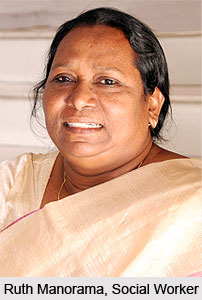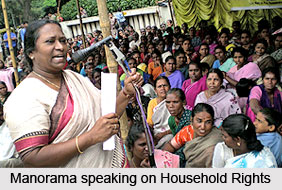 Ruth Manorama is renowned for her contribution towards exposing the Dalit issues in the country, particularly the unfair social conditions underwent through them in India. She addresses the Dalit women as `Dalits among the Dalits`. However, since Ruth Manorama is a follower of Christianity, she cannot be termed as a proper Dalit lady, as Christianity does not believe in any caste. Her efforts of introducing social reforms within the community of Dalits have been appreciated through the Right Livelihood Award which was presented to her in the year 2006. She was amongst the 1000 nominees for the `1000 women for the Nobel Peace Prize` award, during 2005.
Ruth Manorama is renowned for her contribution towards exposing the Dalit issues in the country, particularly the unfair social conditions underwent through them in India. She addresses the Dalit women as `Dalits among the Dalits`. However, since Ruth Manorama is a follower of Christianity, she cannot be termed as a proper Dalit lady, as Christianity does not believe in any caste. Her efforts of introducing social reforms within the community of Dalits have been appreciated through the Right Livelihood Award which was presented to her in the year 2006. She was amongst the 1000 nominees for the `1000 women for the Nobel Peace Prize` award, during 2005.
Early Life of Ruth Manorama
Ruth Manorama was born in the year 1952 in Chennai in the southern Indian state of Tamil Nadu, and her parents were Paul Dhanraj and Dorothy. Growing up in a family who were actively involved in social work, she gradually developed a premature tendency to associate herself with this kind of work. Her mother Dorothy was fond of attaining education and therefore completed her education by attending school despite protests by her conservative husband. Finally Dorothy became a teacher and embraced Christianity during her teens. Since Pandita Ramabai, greatly inspired Ruth Manorama and so she was named `Manorama` after the eldest daughter of Rama Bai.
Her father Paul Dhanraj was a government servant who served the postal department and motivated his poverty-stricken villagers to strive for protecting their rights of protecting their own land which had been their ancestral property. Ruth Manorama and her sisters were inspired to continue their academics and develop their careers, and be financially independent. Manorama received a degree in the field of science at Women`s Christian College, Chennai and also a master`s degree in the discipline of social work from Stella Maris College.
Social Works of Ruth Manorama
 Ruth Manorama started working with a Non Governmental Organisation or NGO after the completion of her master`s degree in Chennai. During this point of time, heavy floods devastated the region around her workplace which was Dhideer Nagar, Saidapet. Along with her colleagues, Manorama was capable of getting the slum remodelled by enhancing the public facilities and raising the ground levels to avert the floods which submerged the place. Thereafter, she registered the Bangalore Gruhakarmikara Sangha or Domestic Worker`s Union as an official trade union, while she rendered her services to the Women`s Voice.
Ruth Manorama started working with a Non Governmental Organisation or NGO after the completion of her master`s degree in Chennai. During this point of time, heavy floods devastated the region around her workplace which was Dhideer Nagar, Saidapet. Along with her colleagues, Manorama was capable of getting the slum remodelled by enhancing the public facilities and raising the ground levels to avert the floods which submerged the place. Thereafter, she registered the Bangalore Gruhakarmikara Sangha or Domestic Worker`s Union as an official trade union, while she rendered her services to the Women`s Voice.
In the year 1986, she was asked to take part in a cross-cultural research between the Dalits in the nation and the Afro-American Blacks in the United States. She aimed to study thoroughly the lifestyles of black women and compare it with that of the Dalit ladies in India. She grasped that there were certain similarities in the circumstances and conditions of the peripheral communities scattered across the globe. She played an active role in organising the Dalits towards the World Conference Against Racism in Durban, which was successful in placing the social issue on the global platform. She was a member of the Asian Women`s Human Rights Council. She had arranged a public hearing during 1993 on Violence Against Dalit Women in the city of Bangalore and also the National Federation of Dalit Women.
She also played a crucial part in effectually coordinating the South India chapter of the preparations for the purpose of Fourth UN World Conference on Women in Beijing in the year 1995. Following her return to the nation after the UN Conference, it was decided by the Advisory Group that Manorama would be the president of the National Alliance of Women or NAWO.




















